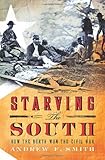|
Starving the South: How the North Won the Civil War, by Andrew F. Smith
New York: St. Martin's Press, 2011. Pp. vi, 296. Illus., notes, index. $27.99. ISBN: 031260181.
Starving the South
is not a cheery work, for it portrays the hard choices people, South and North, had to make, and puts to bed the notion of a happy Confederate citizenry.
As do most wars, the Civil War fell hardest on the common Confederate soldiers, who were subject to the draft. As they were mostly food farmers, productivity declined. So they starved in the army, as did their families at home. As for the North, Smith poses the question: Is it more moral to reduce a people to hunger rather than death to subdue them? Both William T. Sherman and Philip Sheridan answered “Yes” to this question. However Smith fails to consider that in this, Jefferson Davis and Robert E. Lee also bore responsibility. By the fall of 1864 it was clear the Confederacy was going to lose, in part because of hunger and mass desertion, yet Davis and Lee were undeterred in their quest for victory.
Although Smith covers many absorbing topics, one is of most importance: that food shortages often drove decision-making. She examines four particular cases:
-
The Union decision to operate against salt deposits
-
Confederate impressment of supplies, which caused disaffection among civilians, resulting in hoarding and land left fallow
-
The Union’s decision to trade cotton for food, which increased federal revenue through sales but prolonged the war, as the policy helped supply Confederate armies
-
Sherman’s conclusion that only broad scale deprivation of supplies would force Lee’s army in Virginia to surrender, leading to the march through Georgia and the Carolinas, and a 60-mile wide path of foraging and destruction.
In the end, of course, Lee surrendered because he had few troops left and no way to obtain food supplies, as every route had been closed off around him.
Beyond this, Smith covers a myriad of other topics: how cotton cultivation affected food production, the effects of the naval blockade, railroads, inflation, bread riots, “starvation parties,” the “first” Thanksgiving in 1864, labor shortages, and malnutrition among horses. His discussion of Sherman’s march is a bit shaky as he states Sherman’s orders were legal, but gives the impression of pure plunder.
Smith has made a very important contribution to Civil War literature by demonstrating that the issue of food and the Confederacy was not just one of how hungry the Southern troops were. He
demonstrates that, in a sense, one can argue the Civil War was one great siege operation of the whole South.
Our Reviewer: C. Kay Larson, is an independent scholar based in New York. She is the author of Great Necessities: The Life, Times and Writings of Anna Ella Carroll, 1815-1894 and the novel South Under a Prairie Sky: The Journal of Nell Churchill, US Army Nurse & Scout. A member of the board of the New York Military Affairs Symposium, she has contributed to MINERVA: Quarterly Report on Women and the Military, and is a reviewer for the H-CivWar List. She has contributed essays on "Monitor's Brave Fellow," "Women at War," "The Count and the Gymnasts," and "A Woman with Flare" to The New York Times Disunion blog series and is currently working on a revised and expanded edition of her 1995 book Til I Come Marching Home: A Brief History of American Women in World War II.
---///---
Reviewer: C. Kay Larson

Buy It At Amazon.com
|